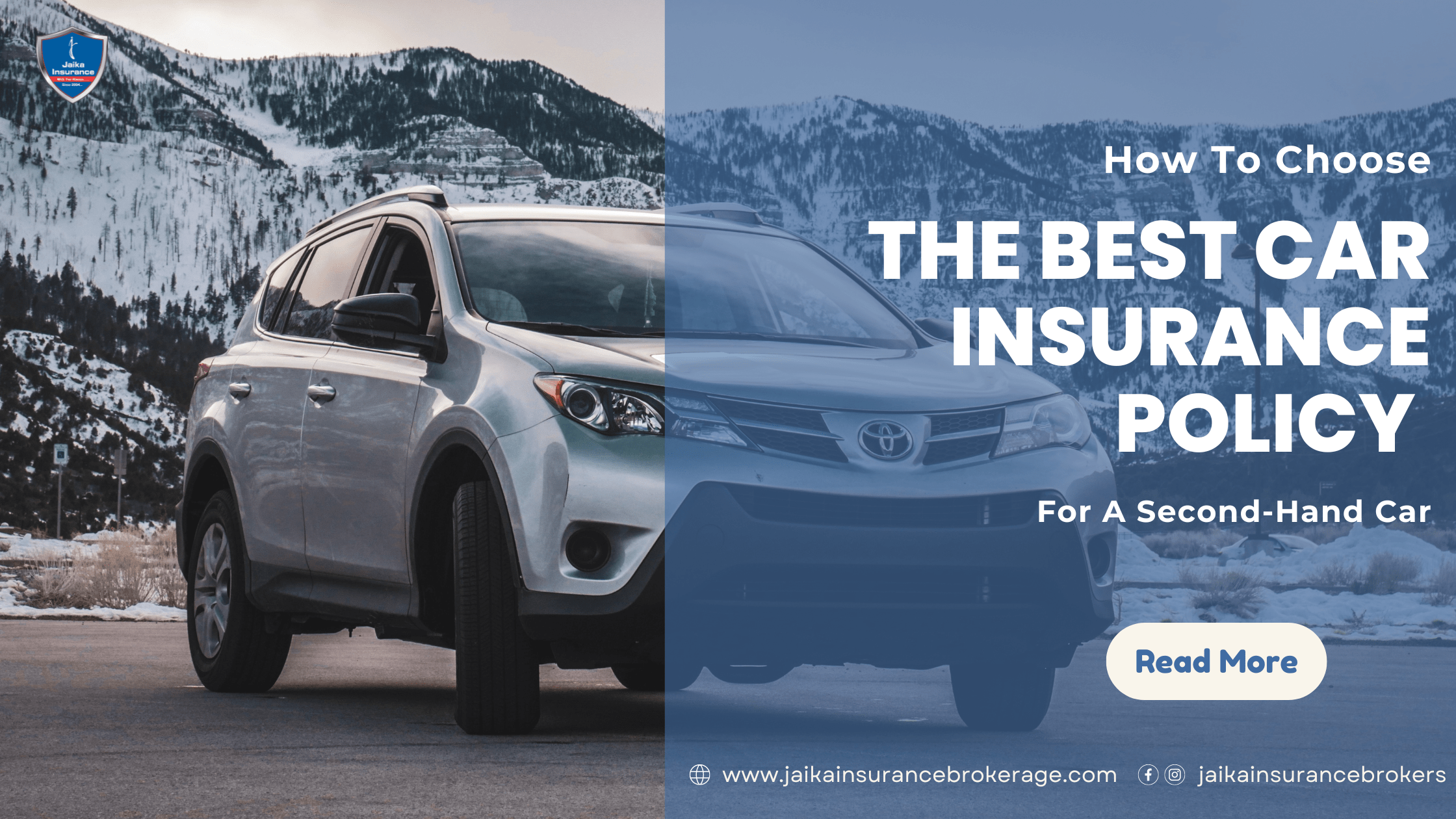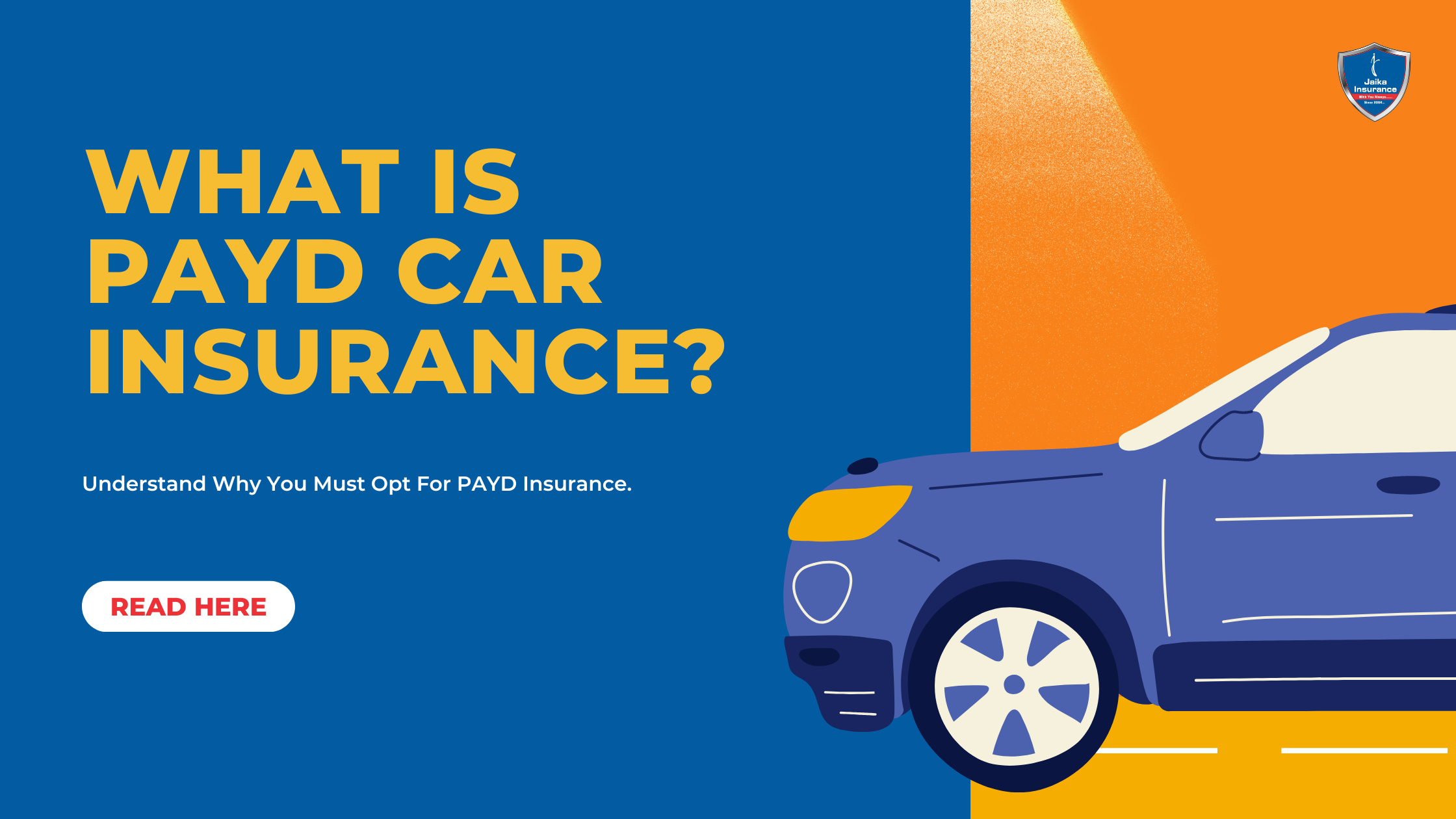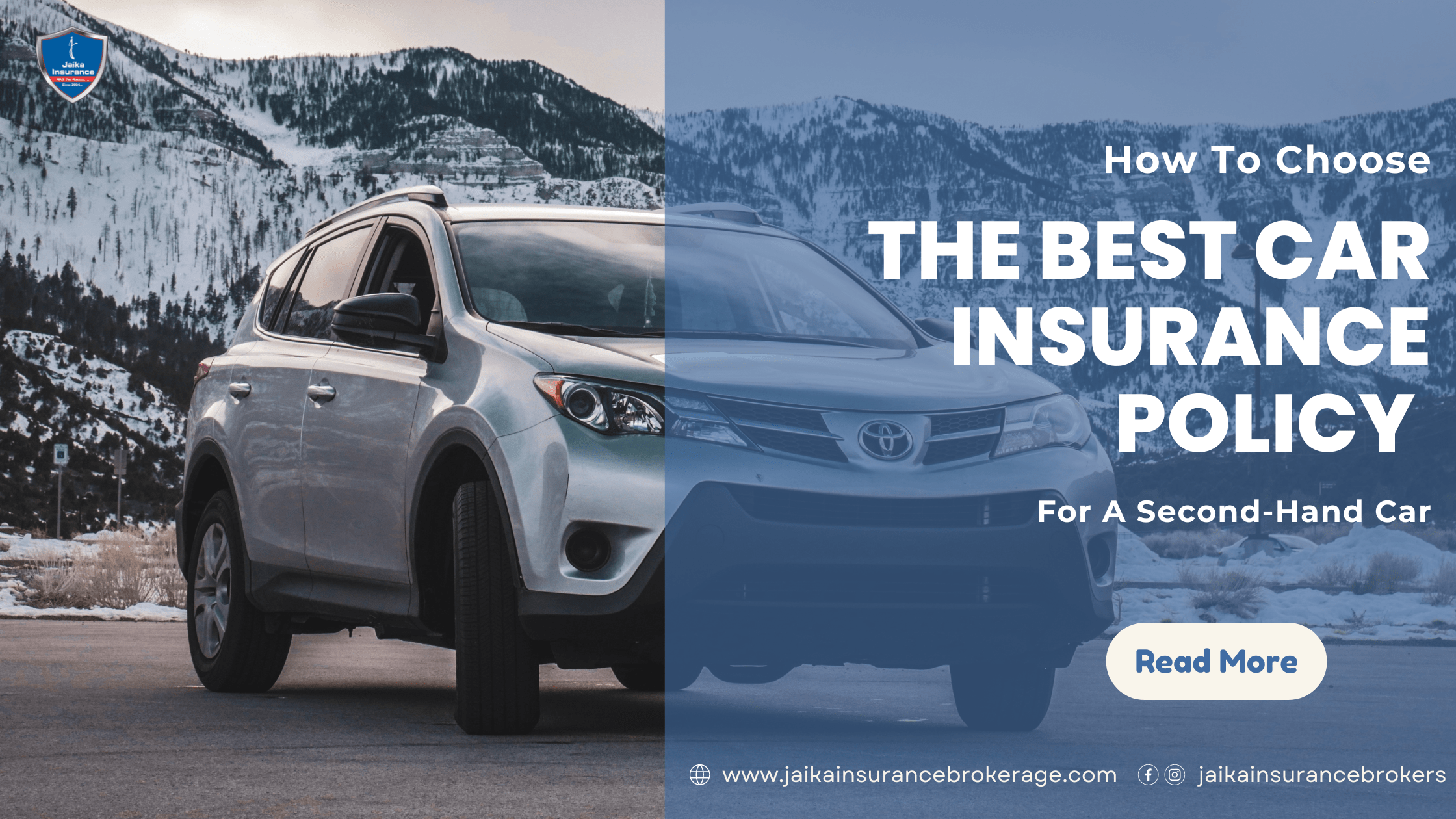In a country like India, where the automotive industry is booming and aspirations for car
ownership are high, second-hand cars have gained immense popularity. A significant percentage of
the Indian population opts for second-hand cars. It's no surprise considering the numerous
advantages they offer, such as affordability, a wide range of options, and lower depreciation
costs. While second-hand cars offer undeniable advantages, it's important to recognize that they
come with their own set of risks and uncertainties. That's where a comprehensive car insurance
policy steps in to provide you with the necessary financial protection.
If you're one of the
smart individuals who have chosen to own a second-hand car, it's essential to ensure that you
have the right car insurance policy in place. By carefully selecting the right insurance policy,
you can safeguard yourself against unforeseen events, such as accidents, theft, natural
calamities, and other damages, ensuring that your investment is well-protected.
However,
navigating through the sea of insurance options can be overwhelming, especially when it comes to
finding the best coverage for your specific needs. But worry not, because, in this comprehensive
guide, we will walk you through the essential steps to choose the best car insurance policy for
your second-hand car while ensuring you make a well-informed decision.
Why A New Car Insurance Policy Is A Must Have While Buying A Pre-Owned
Car?
It's essential to understand that along with the purchase of a pre-owned car comes the need for a
new car insurance policy. While the previous owner may have had insurance coverage, it is
imperative to secure a policy of your own.
In this blog, we will delve into the reasons why
obtaining a new car insurance policy is a must-have when buying a pre-owned car, ensuring that
you are adequately protected and can enjoy your vehicle with peace of mind.
Transfer of Ownership and Liability:
When you purchase a pre-owned car, the ownership and liability of the vehicle are transferred to
you. While the previous owner's insurance may have covered the car before the sale, it does not
automatically extend to you as the new owner. By acquiring a new car insurance policy, you
assume legal ownership and protect yourself from any potential liabilities that may arise while
operating the vehicle.
Personalized Coverage:
Every car owner has unique needs and requirements when it comes to insurance coverage. By
securing a new car insurance policy, you have the opportunity to tailor the coverage to your
specific needs. This ensures that you have the right level of protection against accidents,
theft, damages, and other unforeseen events that may occur during your ownership of the
pre-owned car.
Assessing the Condition and Value of the Vehicle:
A new car insurance policy allows the insurance provider to assess the current condition and
value of the pre-owned car. This evaluation is crucial in determining the appropriate coverage
for the vehicle. Insurers consider factors such as the age, make, model, mileage, and overall
condition of the car to provide accurate coverage and ensure that you are adequately protected.
Protection against Pre-Existing Damages:
With a pre-owned car, there may be pre-existing damages or wear and tear that occurred before
your purchase. Acquiring a new car insurance policy allows you to document these existing
damages and protect yourself from any potential disputes regarding their coverage in the future.
This ensures that you are not held financially responsible for damages that were present before
you became the owner.
Access to Additional Benefits and Services:
By securing a new car insurance policy, you gain access to a range of additional benefits and
services provided by insurance providers. These benefits may include roadside assistance, towing
services, coverage for personal belongings, emergency medical expenses, and more. Availing of
these services enhances your overall ownership experience and provides additional peace of mind.
What Are The Inclusions And Exclusions Of A Car Insurance Policy For A
Pre-Owned Vehicle?
When it comes to a car insurance policy in India for a pre-owned vehicle, it's important to
understand the inclusions and exclusions to ensure that you have a comprehensive understanding
of your coverage. Here are the typical inclusions and exclusions you can expect:
Inclusions:
Own Damage Coverage:
This covers the damages to your vehicle caused by accidents, theft, fire, natural disasters, and
vandalism. It includes the cost of repairs or the market value of the vehicle in case of total
loss.
Third-Party Liability Coverage:
This is mandatory by law and covers your legal liabilities for causing injury, death, or
property damage to a third party. It protects you from financial liabilities arising from
accidents involving your pre-owned vehicle.
Personal Accident Cover:
This provides coverage for accidental death or bodily injury suffered by the owner-driver of the
insured vehicle.
Premium Contributions
Group members may be required to contribute towards the premium cost of the insurance policy. In
many cases, the employer or group sponsor subsidizes a portion of the premium, reducing the
financial burden on the individual members.
Add-On Covers:
You can opt for additional covers or riders to enhance your policy. Common add-on covers include
zero depreciation, engine protection, roadside assistance, consumables cover, and more. These
covers provide extra protection for specific situations and can be customized based on your
requirements.
Access to Healthcare Services
Once enrolled, group members can access healthcare services covered by the policy. This can
include consultations with doctors, hospitalizations, diagnostic tests, prescription
medications, preventive care, and other medically necessary treatments. The insurance provider
typically maintains a network of healthcare providers, and members may be encouraged to seek
services from in-network providers to maximize coverage and minimize out-of-pocket costs.
Exclusions:
Wear and Tear:
Regular wear and tear of the vehicle or its parts are not covered by the insurance policy. It is
the owner's responsibility to maintain the vehicle in good condition.
Mechanical or Electrical Failures:
Any mechanical or electrical failures, breakdowns, or malfunctions of the vehicle are generally
not covered under a standard car insurance policy. These are considered maintenance or repair
expenses.
Consequential Damages:
Damages that occur as a result of an insured event, such as an accident, but are not directly
caused by it, are not covered. For example, if an accident causes damage to the engine, the
engine repair or replacement may not be covered.
Drunk Driving:
If an accident occurs while the driver is under the influence of alcohol or drugs, the insurance
policy may not provide coverage. Driving under the influence is illegal and is considered a
violation of the policy terms.
Unlicensed or Unauthorized Drivers:
If the accident occurs while the vehicle is being driven by an unlicensed or unauthorized
driver, the insurance coverage may be voided. It is important to ensure that only valid license
holders operate the vehicle.
How To Choose The Best Car Insurance Policy For A Pre-Owned Car?
Choosing the best car insurance policy for a pre-owned car requires careful consideration and
evaluation of various factors. Here are some essential steps to help you make an informed
decision:
Assess Your Needs:
Evaluate your specific requirements and expectations from the car insurance policy. Consider
factors such as the age, make, model, and market value of the pre-owned car, as well as your
budget and coverage preferences.
Research Insurance Providers:
Look for reputable insurance providers with a good track record in the industry. Consider their
financial stability, customer reviews, and claim settlement history. This will ensure that you
choose a reliable insurance company that will be there for you when you need them the most.
Compare Coverage Options:
Compare the coverage options offered by different insurance providers. Look for policies that
offer comprehensive coverage, including own damage, third-party liability, personal accident
cover, and add-on covers that suit your specific needs.
Check Policy Inclusions and Exclusions:
Carefully review the inclusions and exclusions of the insurance policy. Understand what is
covered and what is excluded to avoid any surprises during claims. Ensure that the policy covers
common risks, such as accidents, theft, fire, natural disasters, and vandalism.
Consider IDV and Deductibles:
Insured Declared Value (IDV) is the maximum amount that the insurance company will pay in case
of a total loss. Choose a policy with an appropriate IDV that reflects the current market value
of your pre-owned car. Also, consider the deductibles (the amount you need to pay from your
pocket during a claim) and choose a policy with deductibles that are reasonable and affordable
for you.
Evaluate Additional Benefits:
Look for additional benefits and add-on covers that can enhance your policy. These may include
roadside assistance, zero depreciation, engine protection, consumables cover, and more. Assess
your requirements and opt for add-ons that provide meaningful value.
Seek Discounts:
Inquire about available discounts that can help you save on premiums. Insurance companies often
offer discounts for factors such as installing safety devices, being a member of an automobile
association, and having a good driving record. Take advantage of these discounts to reduce your
insurance costs.
Read and Understand the Policy Document:
Thoroughly read and understand the terms and conditions mentioned in the policy document. Pay
attention to details such as claim procedures, claim settlement process, and renewal procedures.
Seek clarification from the insurance provider if you have any doubts or questions.
Consider Customer Service:
Evaluate the customer service provided by the insurance company. Quick and efficient customer
support is crucial during emergencies or while making a claim. Look for a company that is known
for its prompt and reliable customer service.
Seek Recommendations:
Seek recommendations from an insurance advisor, alongside friends, family, or trusted sources
who have experience with insuring pre-owned cars. A professional’s insights and feedback can
help you make a well-informed decision.
Conclusion
Selecting the best car insurance policy for your pre-owned car is an important decision that
requires careful consideration. Therefore, you need to be mindful while choosing a policy for
your car.
At Jaika we suggest you follow the steps outlined in this guide, you can make an
informed choice and ensure that your vehicle is well-protected. Remember to assess your specific
needs, research insurance providers, compare coverage options, and thoroughly understand the
policy's inclusions and exclusions. If you face any difficulty while assessing your insurance
needs, Jaika Insurance Brokerage is just a call away.
By choosing the right car insurance
policy, you can safeguard your pre-owned car against various risks, including accidents, theft,
natural disasters, and third-party liabilities. This will provide you with peace of mind and
financial protection, allowing you to enjoy your vehicle without unnecessary worries.
Keep in
mind that maintaining a good driving record, regularly servicing your car, and adhering to
traffic rules will not only keep you safe but also contribute to favorable insurance
experiences. Stay informed about the policy terms and renewal procedures to ensure continuous
coverage and seamless claims processes.



